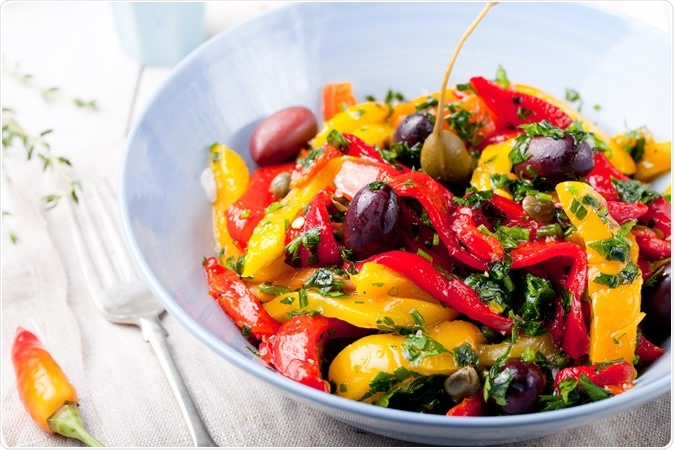
Sofrito cooking technique releases healthy nutrients
Researchers from the Faculty of Pharmacy and Food Sciences at the University of Barcelona, the Physiopathology of Obesity and Nutrition Networking Biomedical Research Centre (CIBERobn) and the Diabetes and Associated Metabolic Diseases Networking Biomedical Research (CIBERDEM) have come up with a new study that reveals that cooking vegetables in the sofrito (sauté) with extra virgin olive oil could release certain bioactive compounds from the garlic, onion and tomatoes that could be beneficial for the body.
The study was led by lecturer Rosa M. Lamuela and was published in the latest issue of the journal Molecules and is titled, “Using Extra Virgin Olive Oil to Cook Vegetables Enhances Polyphenol and Carotenoid Extractability: A Study Applying the sofrito Technique.” This study article is a part of a special issue of the journal called, “Olive Bioactives: From Molecules to Human Health.”

Image Credit: Anna_Pustynnikova / Shutterstock
Researchers explain that their research reveals the reason why the Mediterranean diet is nutrient rich and beneficial for health. In the Mediterranean diet there is a high consumption of phytochemicals from fruits, vegetables and legumes. These directly translate into benefits for the heart and metabolism. Lamuela was part of a large study called the PREDIMED study that was conducted between 2003 and 2011 in over 7,000 participants. That large multi-centric study had revealed the Mediterranean diet to be one of the healthiest diets for the heart and cardiovascular system. She explains that the reason behind these benefits have been since then studied in details.
The researchers explain that incorporation of the Mediterranean diet among non-Mediterranean populations did not show the same benefits as seen among these from Mediterranean descent. They discovered that this difference in benefits could be because of the cooking methods. They then tried to explore if the health benefits of Mediterranean diet was more due to the food components or the way they were cooked.
The team noted that sofrito is the key method in Mediterranean cooking. This form of sautéing vegetables with tomato, garlic and onions in extra virgin olive oil produced a sauce. The researchers found that this sauce releases at least forty different phenolic compounds and high levels of carotenoids. When consumed, these compounds are all beneficial for the heart health as well as insulin sensitivity the researchers write.
Lamuela, lead author and director of the Institute for Research on Nutrition and Food Safety (INSA-UB), in a statement said, “The main result of the study is that cooking vegetables with extra virgin olive oil favours the bioactive compounds, such as carotenoids and polyphenols that are present in vegetables we find in sofrito, to move to the olive oil, which enables the absorption and bioactivity of these compounds.”
The team found that olive oil and onions when cooked together could release certain molecules that are similar to carotenoids (Carotenoids Z isomers) having a rich antioxidant potential. The process of cooking also releases the polyphenols from the vegetables to the oil, they add. The polyphenols they detected were “naringenin, ferulic acid, and quercetin”. José Fernando Rinaldi de Alvarenga, first author of the study said, “We saw that this increase can occur due the migration of bioactive compounds (carotenoids and polyphenols) from the tomato to the oil during the cooking process, which favours the absorption of these compounds.” The team writes that these compounds have anti-inflammatory properties as well and thus their health benefits could be explained.
Related study
Yet another study in the same lines was published recently (April 2019) in the journal Nutrients. This study was also conducted by a team that included Lamuela. The study was titled, “Acute Effect of a Single Dose of TomatoSofrito on Plasmatic Inflammatory Biomarkers in Healthy Men” and was from the Department of Nutrition, Food Sciences and Gastronomy, School of Pharmacy and Food Sciences, University of Barcelona. This article was part of a special issue of the journal called, “Plant Food, Nutrition and Human Health.”
The authors of the study explain the benefits of sofrito that is a “Mediterranean tomato-based sauce that typically also contains olive oil, onion, and garlic.” The team explains that this sauce contains carotenoids and polyphenols in a more bioavailable form that can be easily absorbed by the body.
The study involved 22 healthy male subjects who were asked to consume 240 g/70 kg of sofrito in a single dose. No tomato products were then allowed for the next three days. Before the diet of sofrito the participant was kept on a low-antioxidant diet for a day. After three days of consuming the sofrito, blood levels of carotenoids, total polyphenol excretion (TPE), C-reactive protein (CRP), interleukin-6 (IL-6), interleukin 1β (IL-1β) and tumor necrosis factor-α (TNF-α) were evaluated. The last four are inflammatory biomarkers. Results revealed that there was a significant decline in the inflammatory biomarkers after the sofrito intake.
Sources:
- Using Extra Virgin Olive Oil to Cook Vegetables Enhances Polyphenol and Carotenoid Extractability: A Study Applying the sofrito Technique, José Fernando Rinaldi de Alvarenga, Paola Quifer-Rada, Fernanda Francetto Juliano, Sara Hurtado-Barroso, Montserrat Illan, Xavier Torrado-Prat and Rosa Maria Lamuela-Raventós, Molecules 2019, 24(8), 1555; https://doi.org/10.3390/molecules24081555, https://www.mdpi.com/1420-3049/24/8/1555/htm
- Acute Effect of a Single Dose of Tomato Sofrito on Plasmatic Inflammatory Biomarkers in Healthy Men, Sara Hurtado-Barroso, Miriam Martínez-Huélamo, Jose Fernando Rinaldi de Alvarenga, Paola Quifer-Rada, Anna Vallverdú-Queralt, Silvia Pérez-Fernández and Rosa M. Lamuela-Raventós, Nutrients 2019, 11(4), 851; https://doi.org/10.3390/nu11040851, https://www.mdpi.com/2072-6643/11/4/851






















.png)












No hay comentarios:
Publicar un comentario